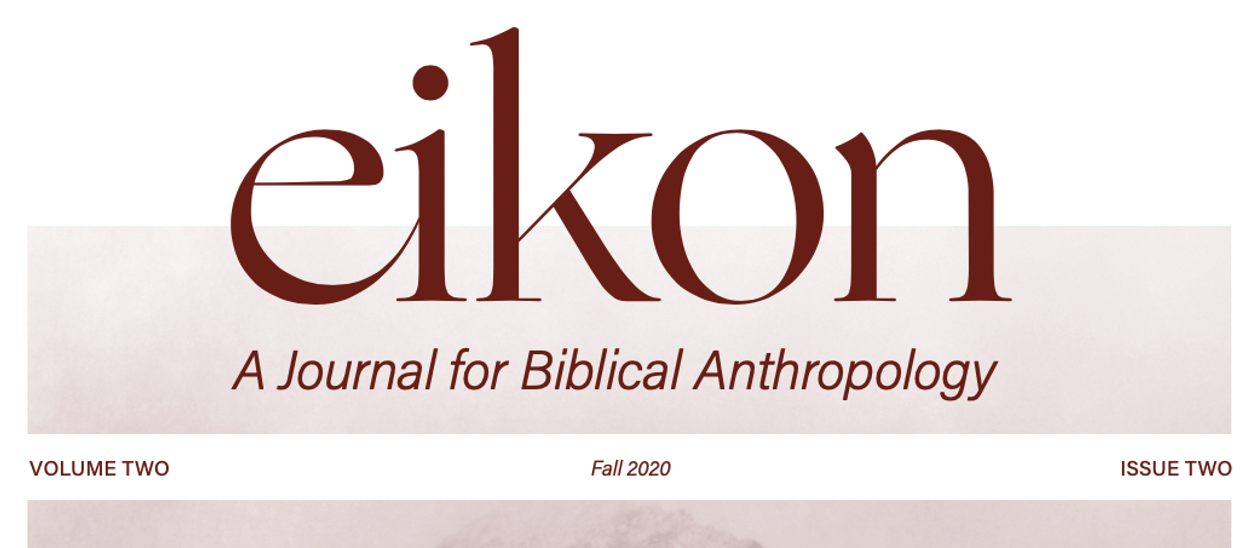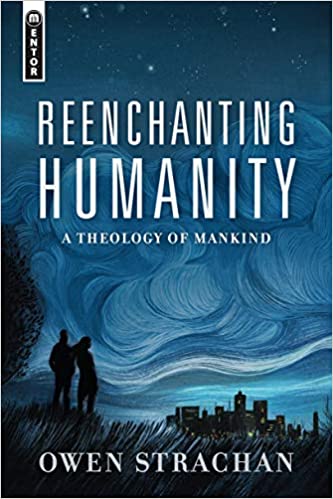Editor’s Note: The following book review appears in the Fall 2020 issue of Eikon.

Owen Strachan. Reenchanting Humanity: A Theology of Mankind. Fearn, Ross-shire: Mentor, 2019.
 A few decades ago, during the early days of my own theological formation and evangelicalism’s renewed interest in theocentric theology, I remember being puzzled by the publicized topic of a local theology conference, “The Doctrine of Man.” What could be more “man-centered” than that? I thought.
A few decades ago, during the early days of my own theological formation and evangelicalism’s renewed interest in theocentric theology, I remember being puzzled by the publicized topic of a local theology conference, “The Doctrine of Man.” What could be more “man-centered” than that? I thought.
Of course, as I grew in my doctrinal understanding, I saw not only the value, but also the deep need for a grounded anthropology. For a biblical understanding of man only helps one to see more clearly the God who created man. Thus, in our own day of continued theological confusion, perhaps a right focus on the doctrine of man is still just what we need to reorient our thinking of God and to keep him central. Owen Strachan is convinced of this very thing and his Reenchanting Humanity serves well as a reorienting guide for evangelicals and other interested readers.
Strachan’s work presents a “theology of mankind” and is built on the premise that as mankind is held captive under the spell of depravity, humanity needs reenchantment to fix its ailments and maladies — the chief of which is the denial of God and acknowledgement of his existence.
In nine chapters, Reenchanting Humanity covers both the traditional loci of a doctrinal anthropology and new facets tailored to the contemporary milieu. Strachan bolsters each study with helpful biblical exegesis and contemporary illustrations. A strength of his method is a return to his sturdy theme of reenchantment.
Chapter 1 starts with the imago Dei and mankind as a “God-stamped” creature. Strachan relates that these first principles which define the human person serve as the first step in the reenchantment of humanity, as discovery of this biblical foundation allows mankind “to rise from the primordial ooze” (50).
The second chapter pivots to harmartiology and the depths of mankind’s depravity. One helpful construction in this chapter is the presentation of the “fourfold death of Adam” Strachan uses to explore the wide and deep effects of the sin of the first man. Adam dies judicially, spiritually, physically, and eternally — and this is just one way this book helps its readers to find reenchantment. By understanding the falseness of mankind, the reader can face “the plain truth of our inherent badness” and see the “one hope for sinful humanity: Christ” (94).
Chapter 3 explores the vocational nature of anthropology and the ways humans are designed for work. Reclassifying the purpose of work and the end for which one works, Strachan revives a healthy perspective that one’s approach to work and leisure matters and serves as a vehicle for the glorification of God.
The fourth chapter is the longest, and with ample justification. The greatest area of doctrinal confusion and manipulation in the twenty-first century resides in sexual anthropology. Here Strachan delineates a biblical perspective on gender, marriage, fatherhood and motherhood, transgenderism, homosexuality, and lust and desire. Strachan has written on these topics in a variety of venues, scholarly and popular, and is well-versed in navigating these questions of the day with clarity that is rare among evangelicals.
Chapter 5 examines race and ethnicity with the affirmation that “the Bible-following church cannot see diversity as a problem but as a sign of God’s beautiful creativity” (219). In an era when churches are divided over these issues, Strachan proposes a reenchanting way forward that centers on a Christocentric approach to unity activated by the knowledge that “who we are in Christ, and comprehending afresh just how powerful his cross is, provides us with the only lasting hope of oneness on this planet” (242).
The sixth chapter contributes a novel facet of the doctrine of humanity: technology. Here Strachan looks at the creative capacity of mankind and acknowledges that Jesus “did not lead his followers into a cave” when he began his ministry, but “took the world as it was” (259). With prescience, Strachan addresses the exploratory ideas of transhumanism and posthumanism and asserts with biblical carpentry, “we are not mere matter to be reengineered at a philosopher’s whim; we are an embodied people, and through the temple of the Holy Spirit, our bodies are temples of the living God (1 Cor 6:19)” (282).
Chapter 7 complements the preceding themes through an exploration of justice. Here Strachan directs the reader to remember that “Christianity preaches and promotes true justice, true equity, and true unity” (312). However, remembering why Christianity is able to do this serves as the key for understanding the dependent nature of justice — namely, biblical justice depends on Christ.
The eighth chapter addresses the contingent nature of humanity. Humans are finite creatures bound by the limits of time and a decaying nature. This exploration allows Strachan to present a “theology of death” and herein invites the reader to consider the God-Man and his defeat of death as the only source of hope when facing one’s mortality.
Chapter 9 arrives to tie several recurring themes together and does so through the person and work of Jesus Christ. Strachan gives a teleological anthropology that roots confidence in eternal redemption based on the Second Adam, the eternally generated Son of God who was not made, but who came to reign as King (371). Biblical anthropology “is rigorously personal; it restores humanity to our God-given purpose and design, but more than this it remakes us in the image of Christ, the true man” (382).
A reenchanted anthropology is not only a God-glorifying gift for believers to think anew about their place and position before a perfect God, but also to worship him as the perfect Man, who understands and helps. In Reenchanting Humanity, Strachan aims to give evangelicals a biblical anthropology for the twenty-first century, but he has done more than that. This book serves to illumine, to encourage, and, most importantly, to reorient evangelical thinking. By spending time thinking about a biblical doctrine of man, the spell of depravity is broken, and God is seen anew as the center of the universe.
Jason G. Duesing serves in academic leadership at Midwestern Baptist Theological Seminary and as a member of the CBMW Board of Directors.
You, too, can help support the ministry of CBMW. We are a non-profit organization that is fully-funded by individual gifts and ministry partnerships. Your contribution will go directly toward the production of more gospel-centered, church-equipping resources.